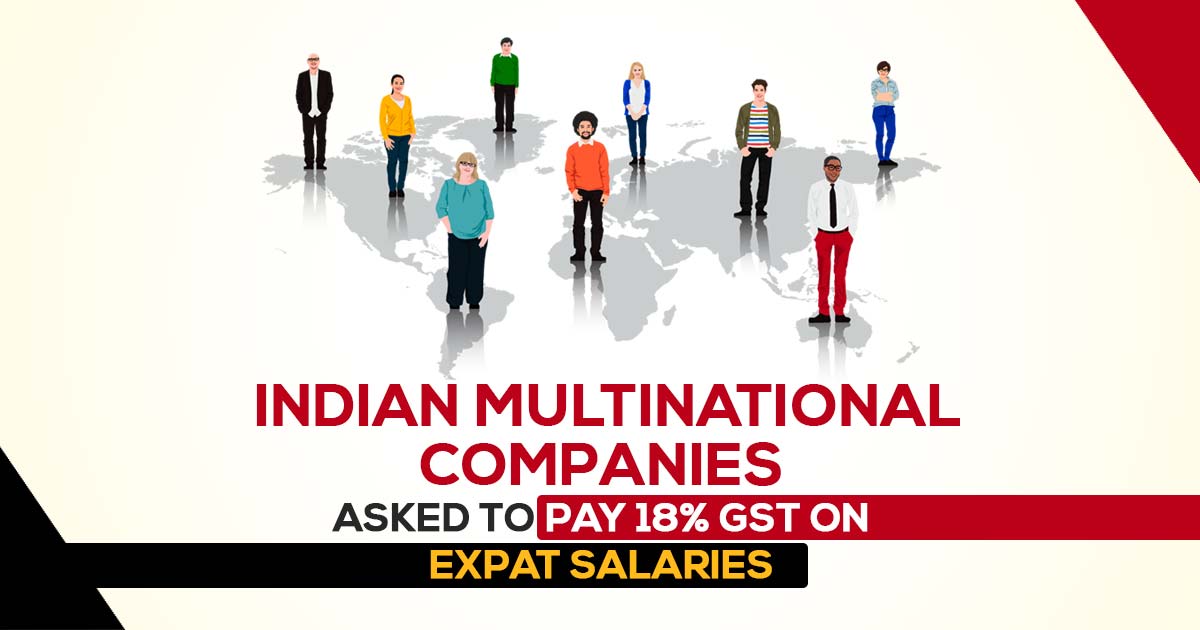
Around 1,000 multinational corporations (MNCs) operating in India have recently been served with tax demands by the goods and services tax (GST) authorities.
These demands pertain to a GST 18 per cent tax on salaries and allowances paid to foreign expatriates (expats) by their parent companies abroad.
Over the past few weeks, tax demands ranging from Rs. 1 crore to Rs. 150 crore have been issued for the period between FY18 to FY22. According to an official familiar with the matter, expats working in Indian subsidiaries of MNCs are subject to GST on payments made by their foreign parent companies.
Audits conducted by local arms of MNCs across various sectors, such as smartphones, automobiles, software, FMCG, consumer durables, and cosmetics, have brought this issue to light.
Read Also:- Cos Get a Wave of GST Demand Notices Associated with Foreign Staff
The official provided clarification that while tax demands for transactions occurring in FY18 had reached the time limit by September 30, demands for the following years (FY19, FY20, FY21, and FY22) are still being issued.
Companies have a 30-day timeline to respond to these tax demands. The GST authorities consider expats’ salaries and allowances, paid by foreign companies and later reimbursed by Indian companies, as equivalent to a “supply of manpower,” rendering them taxable under the GST regime.
This practice persists even if employment contracts are held by a foreign company, allowing expats.
According to the official, expatriates express their need to retain social security benefits in their home country, where their families are living. However, if the Indian company directly pays the employees’ salaries without any reimbursement, they do not attract Goods and Services Tax (GST) since the expatriates are considered employees solely of the Indian company.
This clarification was provided by the official. The recent wave of tax demands on MNCs stems from a Supreme Court ruling in May 2022 regarding the Northern Operating System (NOS) case.
The court ruled that under the reverse charge mechanism (RCM), the secondment (deputation) of employees from a foreign group to an Indian entity qualifies as “manpower supply service” and thus subject to service tax, wherein the recipient is liable to pay the tax instead of the supplier.
Although the decision pertained to service tax in the pre-GST era, it has implications under the GST as the practice of deputing foreign expats and paying their salaries overseas remains common in the industry.
The recent Supreme Court ruling has caused contentions within the industry, leading to differing opinions and actions among the companies involved. While some have chosen to pay the Goods and Services Tax (GST) and claim credit but dispute the interest charges, others have not paid the tax and are seeking legal recourse on the grounds that their circumstances differ from the Northern Operating Systems (NOS) case.
According to a tax expert, revenue authorities have issued several show-cause notices to various players, particularly foreign companies with expatriate employees seconded to their Indian subsidiaries, demanding GST Payment for these arrangements. The industry is currently examining the facts and adopting appropriate approaches.
Further, he added that it is expected that the government will release required guidelines clarifying the definition of employment in the case of expatriates, as well as providing clarity on the nature of manpower supply in different situations.
Careful evaluation of GST exposure on expatriate arrangements is crucial, taking into account the terms of such arrangements, the breakdown of compensation, roles and responsibilities, and the level of control exercised over these employees.
Another tax expert said that although the issue emerged during recent audits, many companies had already started reviewing their contracts with expatriates following the Supreme Court’s decision.
Read Also:- Center Issues GST Notices to Foreign Cos for Ensuring Compliance with New Regulations
Experts emphasize the need for clarity in situations where employment contracts fail to specify the role and assignment of expatriates. Questions arise regarding the imposition of the levy if an expatriate ends their relationship with the Indian arm or if they are simultaneously payrolled on both the parent company and the local entity.
It has been observed that notices were issued to companies where the contract is specifically with the Indian entity. However, there is still uncertainty regarding the potential liability for Goods and Services Tax (GST) for expatriates serving in a consulting capacity, as per the experts.










Hi Good evening,
In one of the company the employment contract is between the Company and Foreign expats. Salary is directly paid to Foreign expats in INR as per employment contract with Indian MNC. TDS is deducted u/s 192B under salary. Whether GST LIability under RCM will apply. Employment contract is mentioned in Foreign currency for their understanding and whether this will have an issue if issued to the GST authority.